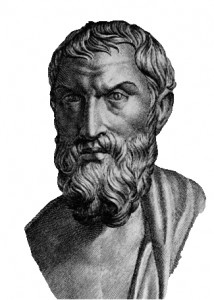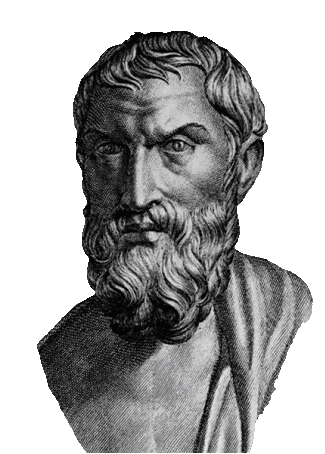Peace and Safety For Your Twentieth of October! – “Just as there is no profit in medicine unless it expels the diseases of the body, so there is none in philosophy either unless it expels the malady of the soul.”
 Peace and Safety to the Epicureans among us, no matter where you might be!
Peace and Safety to the Epicureans among us, no matter where you might be!
For today I have selected a brief excerpt from Chapter Three of DeWitt’s Epicurus and His Philosophy, regarding Epicurus’ development of his doctrine around the time of his stay in Colophon (references are to footnotes in the text):
Epicurus was in revolt also against the teachings of Democritus, Socrates, Plato, and the rest concerning the function of philosophy. The Phi Beta Kappa idea that “Philosophy is the guide of life” was already commonplace, FN3-51 but no one was interpreting it very practically. To the great atomist Leucippus, Epicurus even denied right to the name of philosopher, because he concerned himself with physics to the exclusion of ethics. FN3-52 The ground upon which this was denied was neatly expressed: “Vain is the word of that philosopher by which no malady of mankind is healed.” FN3-53
This position was arrived at by way of the analogy with medicine, itself an inert commonplace in the then current philosophies. He proposed to put life into it: “For just as there is no profit in medicine unless it expels the diseases of the body, so there is none in philosophy either unless it expels the malady of the soul.” FN3-54 With Democritus himself Epicurus was impatient because of his implicit skepticism, which to him was a sort of pessimism, paralyzing to action. Epicurus is thus seen emerging as a natural pragmatist, impatient of all knowledge that lacks relevance to action. Platonic dialectic was to him a superfluity and consisted in “walking around uselessly and harping upon the question. What is the meaning of ‘good’?” FN3-55 At times his zeal becomes truly religious, and his language anticipates the terminology of the New Testament. Of this a specimen is his advice to the young Pythocles: “From the outset you must believe that no other end is gained from the knowledge of celestial phenomena, whether viewed in their associations [with the astral deities] or by themselves, than peace of soul and an abiding faith.” FN3-56 He did not believe in “following the logos” nor in following “knowledge like a sinking star beyond the utmost bound of human thought:” The thing of supreme urgency was not knowledge but the happiness of mankind. He called his teachings “true philosophy,” but they approximated to a religion. He claimed for himself the title of “sage,” but he was really a prophet.
When once Epicurus had discovered himself as a prophet and a pragmatist, a dynamic significance was injected into the analogy between philosophy and medicine. Unlike the Platonists, he was bound to be concerned not only with adolescent males but also with human beings of all ages, including women and children. This new note is promptly and beautifully struck in the opening words of his exhortation to philosophy, the letter to Menoeceus, which was perhaps intended to compete with the famous Protrepticus of Aristotle: “There is no one for whom the hour has not yet come nor for whom the hour has passed for attending to the health of his soul.” FN3-57 This new outlook demanded the offering of instruction to junior pupils, and it may have been this proposal that provoked the scorn of Nausiphanes: “Upon hearing this he so lost his temper as to begin abusing me and taunting me with being a schoolteacher.” FN3-58 As a matter of fact, the Epicureans did establish elementary schools of their own, an example that was followed by the Christians.
Two observations remain to be made in respect of the Colophon period in the life of Epicurus. First, in view of the bitterness engendered in the clash with Nausiphanes, it will seem plausible to assume that the fundamental problems of doctrine above enumerated were threshed out in face-to-face controversy between teacher and pupil. Second, since the Greeks loved gossip, and communication was frequent between city and city, it may be assumed that reports of the contentious heterodoxy of the young Epicurus preceded his arrival in Mytilene and paved the way for the hostile reception there accorded him.
Furthermore, in view of the furor occasioned by his offering himself there as a public teacher, it seems reasonable to assume that the new body of doctrine was worked out to completion in Colophon. A brief chain argument will make the grounds of this assumption explicit.
As will be revealed in due course, the populace of Mytilene was incited to rage against the newcomer and a gymnasiarch was prodded into action. This would mean that an indictment for impiety was either threatened or lodged. From this it can safely be inferred that the denial of all divine participation in human affairs was already part of the offending doctrine. This denial, in turn, was to Epicurus a pragmatic necessity because of his determination to assert the freedom of man. The freedom of man, again, was a pragmatic necessity because of belief in pleasure or happiness as the end established by Nature. To be happy, man must be free to plan his whole life.
Yet again, the free planning of life required, along with the rejection of all shapes of determinism, divine or physical, belief in the possibility of knowledge and the denouncement of skepticism. Moreover, once skepticism had been denounced, it was imperative to set up a canon of truth. Lastly, Epicurus showed himself in Mytilene to be singularly aggressive, and this quality had its origin in his discovery of himself as a prophet and a missionary as well as a sage. It must consequently be inferred that before leaving Colophon he had already worked out to its pragmatic implications the old analogy between philosophy and medicine, that all human beings, regardless of age or sex, stood in need of health of mind and the services of the teacher no less than of health of body and the services of the physician.
__________
As Seneca recorded: Sic fac omnia tamquam spectet Epicurus! So do all things as though watching were Epicurus!
And as Philodemus wrote: “I will be faithful to Epicurus, according to whom it has been my choice to live.“

